Search the Special Collections and Archives Portal
Search Results
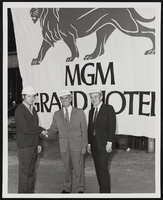
Photographs of men celebrating first MGM construction, Las Vegas (Nev.), February 9, 1973
Date
Archival Collection
Description
Stuart Mason, Al Benedict, and Bernie Rothkopf take group photos celebrating the first construction project of the MGM Grand Hotel. Stamp on back of photos reads "Custom Print by Photography Unlimited; Date 2/9/73; W.O. 1718-6";
Image
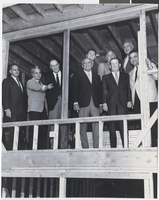
Photograph of the Danny Kolod Building at Temple Beth Sholom during construction.
Date
Archival Collection
Description
Black and white photograph during the construction of the Danny Kolod building at Temple Beth Sholom. Members pictured: Al Benedict, Stan Irwin, Jerry Mack, Irving Devine, Ruby Kolod, Rabbi Aaron Gold, Max Goot and Yale Cohen.
Image
Audio clip from interview with Susan Molasky, March 11, 2014
Date
Archival Collection
Description
Part of an interview with Susan Molasky on March 11, 2014. In this clip, Molasky talks about a fundraiser held for Nathan Adelson Hospice at MGM, in which community members participated in a show, replacing the regular performers.
Sound

List of past presidents of the Jewish Federation of Las Vegas, 2015
Date
Archival Collection
Description
The list includes the past presidents and chairs of the Jewish Federation of Las Vegas, the Women's Division leadership, and the Jewish Emerging Leaders chairs.
Text
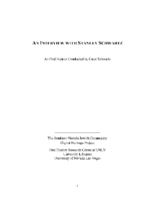
Transcript of interview with Stanley Schwartz by Carol Schwartz, March 1, 1980
Date
Archival Collection
Description
Interview with Stanley Schwartz by Carol Schwartz on March 1, 1980. Stanley talks about coming to Las Vegas in 1951 to open a clothing business on Main Street, Schwartz Brothers Clothing. He compares the business district of the 1950s to the district in 1980, and advertising opportunities in the newspapers and on the radio. Schwartz talks about suit styles and changing preferences of buyers, and moving the store to Second Street, then Fremont Street, then to Maryland Square Shopping Center. In 1970, he changed the focus of the clothing store to "big and tall" and talks about the importance of customer service in retaining customers. He mentions Al Benedict and Herb Tobman as people he admired.
Text
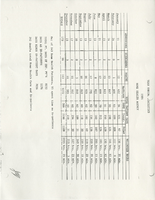
Corporation meeting minutes for Nathan Adelson Hospice, March 19, 1985
Date
Archival Collection
Description
The meeting minutes of the Nathan Adelson Hospice Corporation outline changes made to the by-laws, and statistics for in-patient and at-home care rendered in 1984.
Text

Transcript of interview with Martin, Linda, and Robert Wilner by Barbara Tabach, May 10 & 24, 2016
Date
Archival Collection
Description
During the early 1970s, the boom of Las Vegas included many single people following family who had already settled there. Among those was Martin (Marty) Wilner. Marty?s parents were Leo and Mickey Wilner. Leo moved to Las Vegas to become the Executive Director at Temple Beth Sholom, the only synagogue in town. Marty, who was born and raised in California, had recently earned his doctorate in psychology at the University of Houston. He became a counselor at UNLV. Not long after, Marty met Linda at a Jewish Singles event. Linda was a divorced, mother of three children, who had moved from California to find comfort in living near her parents. Robert Wilner is one of her three children. He was adopted by Marty and works with his mother in the real estate business. In this interview, they recall together the Las Vegas of the 1970s. For Robert, he remembers his bar mitzvah, and growing up with Jewish friends under the careful eye of his grandparents. As an adult, he has enjoyed a successful career as a real estate agents working with his mother. For Linda, the success of real estate was being part of one of the most robust housing markets in the country. She and Robert recall an extensive list of visionaries who developed the valley, as well as the inherent challenges of water, unions and maintaining their high level of ethics.
Text
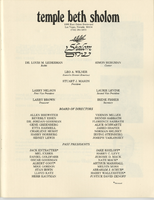
Program from event commemorating retirement of Leo Wilner as Executive Director of Temple Beth Sholom, 1984
Date
Archival Collection
Description
Program booklet for the testimonial dinner held for Leo Wilner's retirement includes dedications from colleagues and friends.
Text

Transcript of interview with Beth Molasky by David Shwartz, June 2, 2014
Date
Archival Collection
Description
In this interview, Molasky discusses her parents, Irwin and Susan Molasky, and growing up in Las Vegas as a member of Temple Beth Sholom. She attended Sunday school and Hebrew school, but is not particularly religious as an adult.
Beth Molasky-Cornell is a partner, shareholder, and an active member of the board of directors of the Molasky Group of Companies, which was founded by her father Irwin Molasky. She is a founding partner and a core member of the board of directors of Ocean Pacific Companies, a high-end real estate development firm founded by her husband Ken Cornell in San Diego, California. Molasky-Cornell contributed to numerous Molasky Group building projects, including the Bank of America Plazas, the Winterwood Corporation land development, and the Park Towers luxury condominiums. Molasky was born in Florida; however, her family moved to Las Vegas before her second birthday. She graduated from Valley High School in 1968, and started college at the University of Southern California at the age of seventeen. After spending a couple of years in Rhode Island, where she had her children, she moved back to Las Vegas in 1975. In this interview, Molasky discusses her childhood experiences in Las Vegas, especially as a member of the Jewish community, and reflects upon changes that influenced her children?s upbringing in the city.
Text
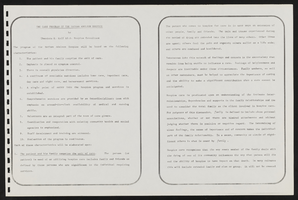
Program for the Design and Operation of The Nathan Adelson Hospice, circa 1980
Date
Archival Collection
Description
A program for the design and operation of The Nathan Adelson Hospice in Las Vegas, Nevada. Included in the program are several appendices on functions, regulations, services, and standards, along with several pages on establishing goals for the hospice. Pages near the end include hand-drawn diagrams and several monetary finance charts.
Text
